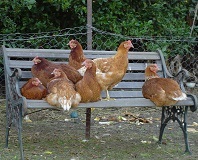Read the latest information on
Foot-and-mouth disease
 Keeping poultry such as chickens, ducks and geese in backyards is a popular practice across Australia, with many people hoping to live sustainably, provide eggs to family and friends or to teach their children about animal rearing and food production.
Keeping poultry such as chickens, ducks and geese in backyards is a popular practice across Australia, with many people hoping to live sustainably, provide eggs to family and friends or to teach their children about animal rearing and food production.
While many birds live safe, healthy and comfortable lives in backyards, it is important to keep good biosecurity practices front-of-mind and work to minimise the risks posed to poultry by pests and diseases.
A few simple biosecurity practices can help prevent a range of complications for your birds.
Backyard keepers should acquire new birds from trusted sources and ensure they are appropriately vaccinated against any conditions as required by law or which are prevalent in the local area.
When considering housing, ensure that both the coop and run are secured against feral and domestic animals, providing safe and secure roosting and nesting locations.
Buying commercial feed is a good option to ensure that what your chickens are eating is nutritious and free of contaminants. Many keepers also choose to recycle food scraps which, while environmentally friendly, poses a few complications. When feeding your birds scraps, ensure you understand what you are feeding them and where it came from. Acquiring scraps from trusted sources and asking questions about the product will help to minimise any risk to your birds.
Where possible, limit contact between your birds and other animals which may transfer soil, insects, plant material or contagious diseases. Ensure that wild birds are kept away from sources of feed and water, and keep these clear of other potential contaminants.
It is also important to be aware that people’s clothing and footwear can bring in soil, weed seeds, insects and bacteria. Ask where people have been prior to visiting your property, and ensure that clothes and shoes are cleaned appropriately before entering your yard. This is especially important if the visitor has been in a high-risk area, such as another property where poultry or livestock are kept.
Keepers also have a responsibility to ensure the products they are producing are safe and fit for purpose, especially when moved off their property. Laws regarding the supply of eggs for human consumption vary from state to state, as do regulations for the collection, storage and use of chicken faeces as fertiliser. Make sure you are aware of and understand your responsibilities when distributing your excess poultry products.
These basic practices can help to ensure that birds are living in a healthy and secure environment, regardless of whether they are raised in a backyard or on a commercial farm. For more information on the basic principles of biosecurity for poultry, check our Chicken industry page.